广东省深圳市Module 1 Unit 1 Encyclopaedias 教案2
文档属性
| 名称 | 广东省深圳市Module 1 Unit 1 Encyclopaedias 教案2 | 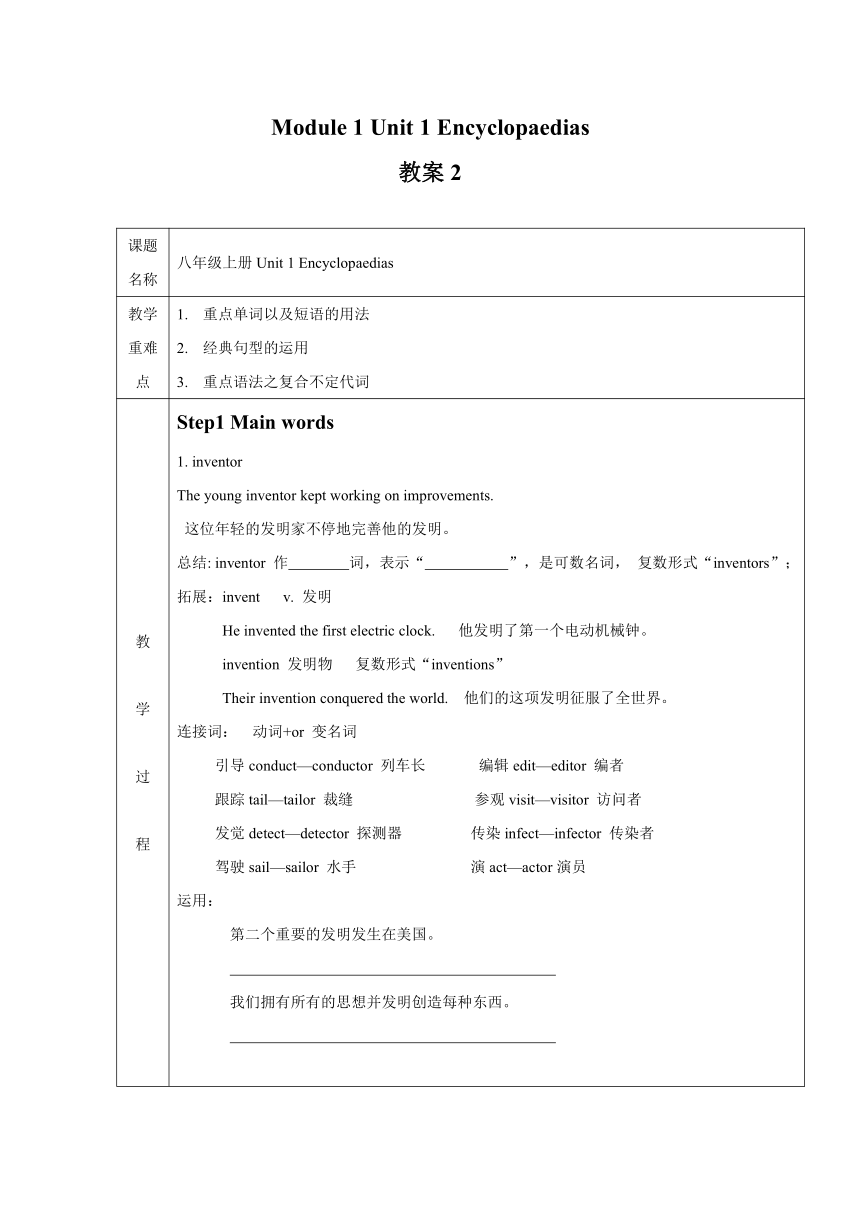 | |
| 格式 | zip | ||
| 文件大小 | 128.1KB | ||
| 资源类型 | 教案 | ||
| 版本资源 | 牛津深圳版 | ||
| 科目 | 英语 | ||
| 更新时间 | 2017-08-09 18:01:36 | ||
图片预览

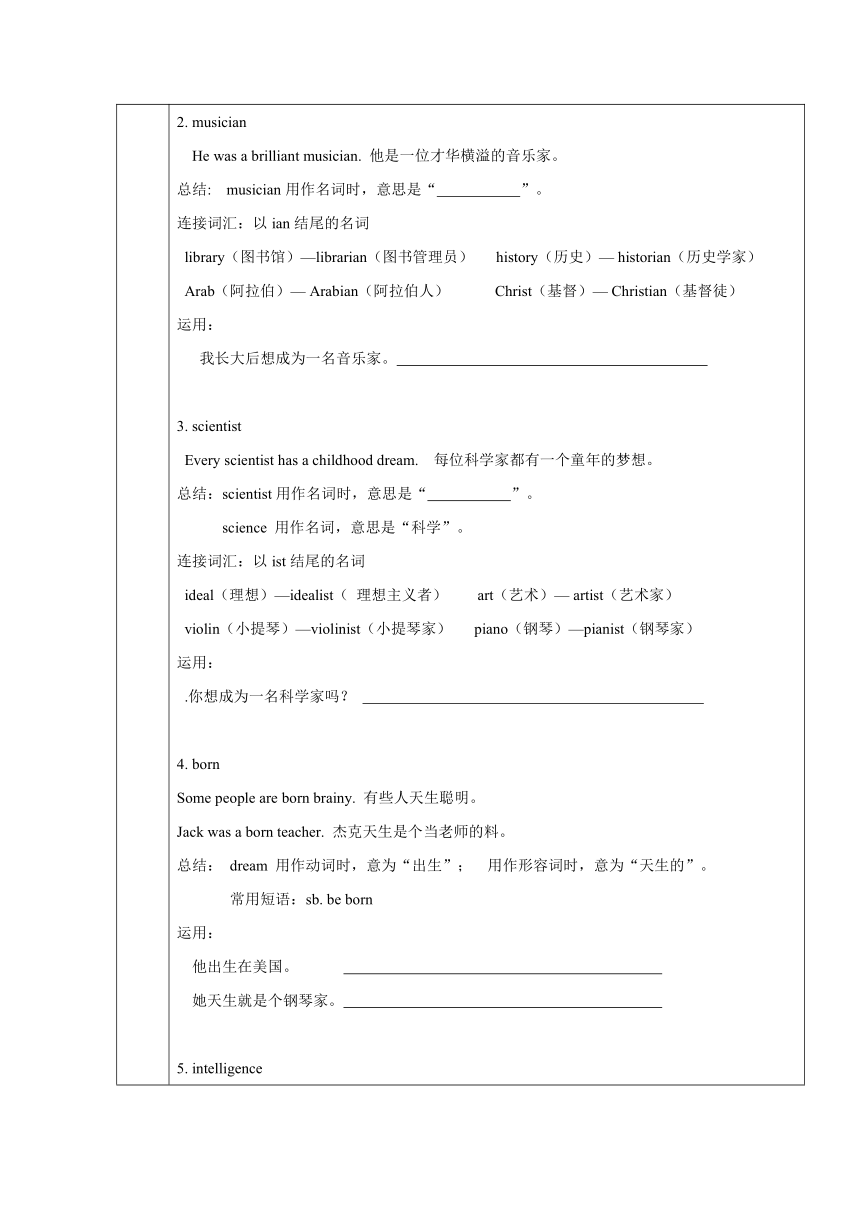
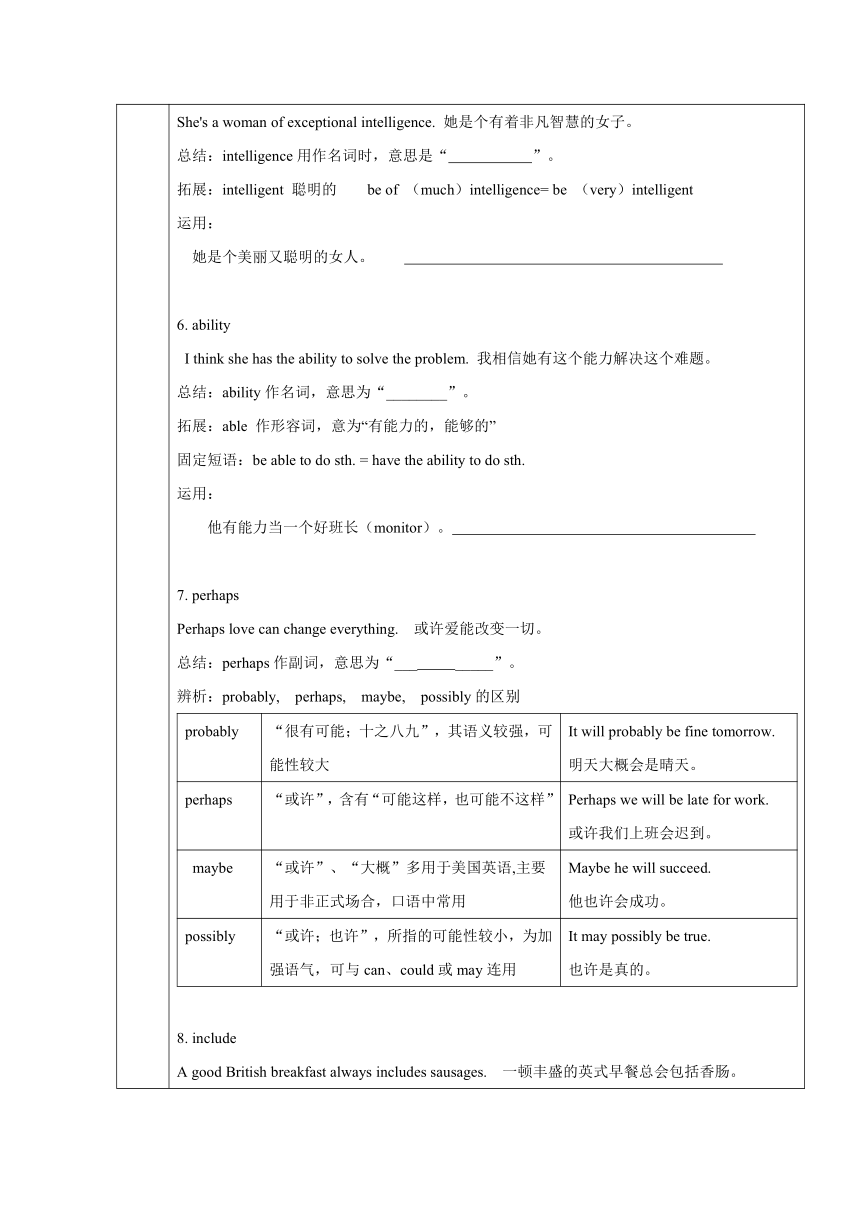
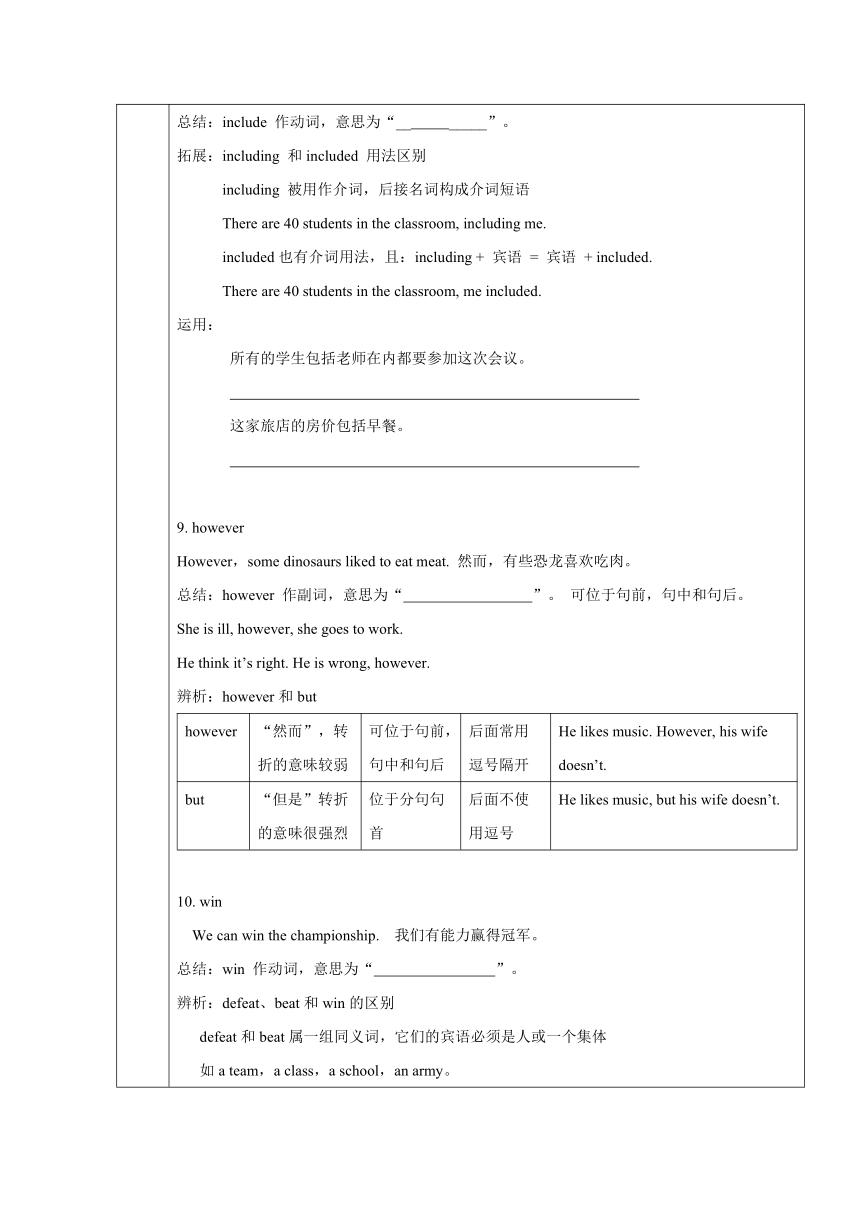
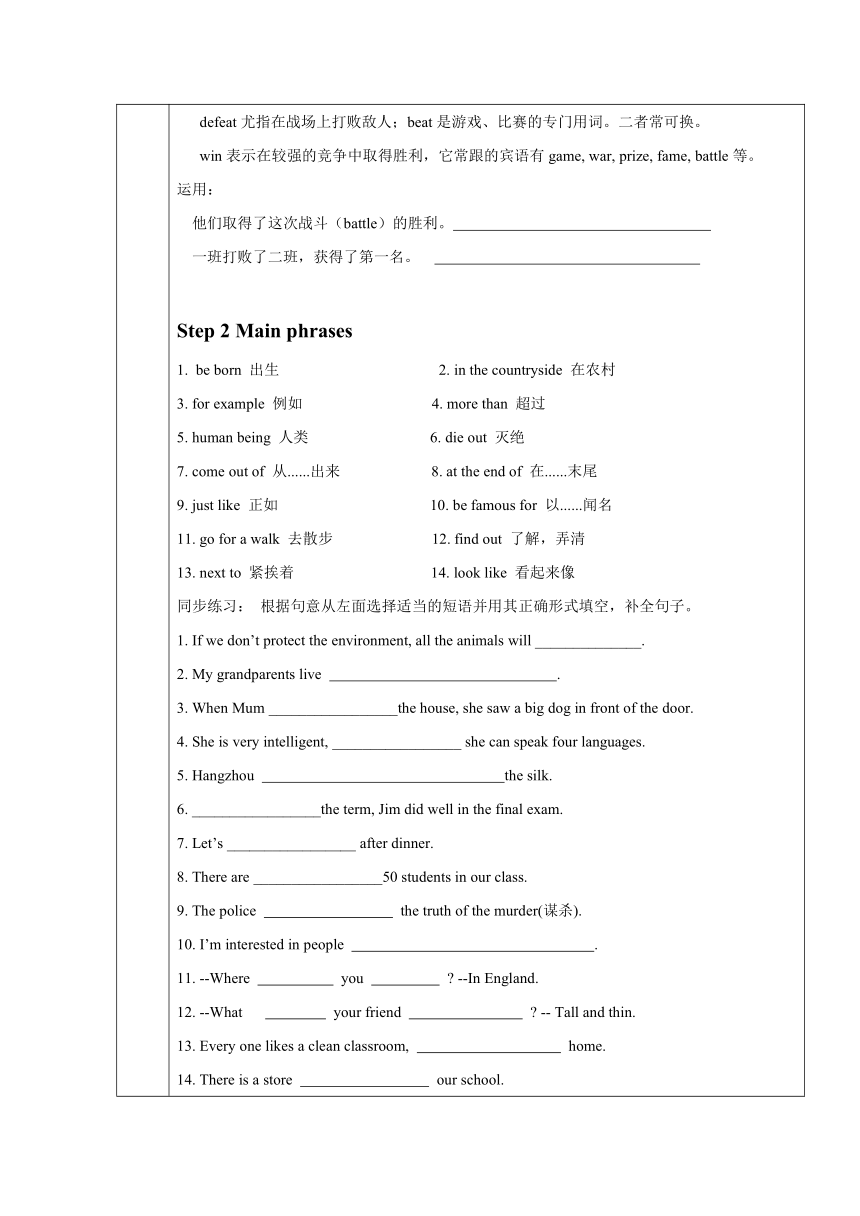
文档简介
Module
1
Unit
1
Encyclopaedias
教案2
课题名称
八年级上册Unit
1
Encyclopaedias
教学重难点
重点单词以及短语的用法经典句型的运用重点语法之复合不定代词
教学过程
Step1
Main
words1.
inventor
The
young
inventor
kept
working
on
improvements.
这位年轻的发明家不停地完善他的发明。总结:
inventor
作
词,表示“
”,是可数名词,
复数形式“inventors”;拓展:invent
v.
发明
He
invented
the
first
electric
clock.
他发明了第一个电动机械钟。
invention
发明物
复数形式“inventions”
Their
invention
conquered
the
world.
他们的这项发明征服了全世界。连接词:
动词+or
变名词
引导conduct—conductor
列车长
编辑edit—editor
编者
跟踪tail—tailor
裁缝
参观visit—visitor
访问者
发觉detect—detector
探测器
传染infect—infector
传染者
驾驶sail—sailor
水手
演act—actor演员运用:
第二个重要的发明发生在美国。
我们拥有所有的思想并发明创造每种东西。
2.
musician
He
was
a
brilliant
musician.
他是一位才华横溢的音乐家。总结:
musician用作名词时,意思是“
”。连接词汇:以ian结尾的名词library(图书馆)—librarian(图书管理员)
history(历史)—
historian(历史学家)Arab(阿拉伯)—
Arabian(阿拉伯人)
Christ(基督)—
Christian(基督徒)运用:
我长大后想成为一名音乐家。
3.
scientist
Every
scientist
has
a
childhood
dream.
每位科学家都有一个童年的梦想。总结:scientist用作名词时,意思是“
”。
science
用作名词,意思是“科学”。连接词汇:以ist结尾的名词ideal(理想)—idealist(
理想主义者)
art(艺术)—
artist(艺术家)
violin(小提琴)—violinist(小提琴家)
piano(钢琴)—pianist(钢琴家)运用:.你想成为一名科学家吗?
4.
bornSome
people
are
born
brainy.
有些人天生聪明。Jack
was
a
born
teacher.
杰克天生是个当老师的料。总结:
dream
用作动词时,意为“出生”;
用作形容词时,意为“天生的”。
常用短语:sb.
be
born
运用:
他出生在美国。
她天生就是个钢琴家。
5.
intelligence
She's
a
woman
of
exceptional
intelligence.
她是个有着非凡智慧的女子。总结:intelligence用作名词时,意思是“
”。
拓展:intelligent
聪明的
be
of
(much)intelligence=
be
(very)intelligent
运用:
她是个美丽又聪明的女人。
6.
abilityI
think
she
has
the
ability
to
solve
the
problem.
我相信她有这个能力解决这个难题。总结:ability作名词,意思为“________”。拓展:able
作形容词,意为“有能力的,能够的”固定短语:be
able
to
do
sth.
=
have
the
ability
to
do
sth.运用:
他有能力当一个好班长(monitor)。
7.
perhaps
Perhaps
love
can
change
everything.
或许爱能改变一切。总结:perhaps作副词,意思为“___
_____”。辨析:probably,
perhaps,
maybe,
possibly的区别probably“很有可能;十之八九”,其语义较强,可能性较大It will probably be fine tomorrow.明天大概会是晴天。 perhaps“或许”,含有“可能这样,也可能不这样”Perhaps we will be late for work.或许我们上班会迟到。
maybe“或许”、“大概”多用于美国英语,主要用于非正式场合,口语中常用Maybe
he
will
succeed.他也许会成功。possibly“或许;也许”,所指的可能性较小,为加强语气,可与can、could或may连用It may possibly be true.也许是真的。8.
includeA
good
British
breakfast
always
includes
sausages.
一顿丰盛的英式早餐总会包括香肠。总结:include
作动词,意思为“__
_____”。拓展:including
和included
用法区别
including
被用作介词,后接名词构成介词短语
There
are
40
students
in
the
classroom,
including
me.
included也有介词用法,且:including
+
宾语
=
宾语
+
included.
There
are
40
students
in
the
classroom,
me
included.运用:
所有的学生包括老师在内都要参加这次会议。
这家旅店的房价包括早餐。
9.
howeverHowever,some
dinosaurs
liked
to
eat
meat.
然而,有些恐龙喜欢吃肉。总结:however
作副词,意思为“
”。
可位于句前,句中和句后。She
is
ill,
however,
she
goes
to
work.He
think
it’s
right.
He
is
wrong,
however.辨析:however和buthowever“然而”,转折的意味较弱可位于句前,句中和句后后面常用逗号隔开He
likes
music.
However,
his
wife
doesn’t.
but“但是”转折的意味很强烈位于分句句首后面不使用逗号He
likes
music,
but
his
wife
doesn’t.10.
win
We
can
win
the
championship.
我们有能力赢得冠军。总结:win
作动词,意思为“
”。辨析:defeat、beat和 win 的区别
defeat和beat属一组同义词,它们的宾语必须是人或一个集体
如a team,a class,a school,an army。
defeat尤指在战场上打败敌人;beat是游戏、比赛的专门用词。二者常可换。
win表示在较强的竞争中取得胜利,它常跟的宾语有game, war, prize, fame, battle等。运用:
他们取得了这次战斗(battle)的胜利。
一班打败了二班,获得了第一名。
Step
2
Main
phrasesbe
born
出生
2.
in
the
countryside
在农村3.
for
example
例如
4.
more
than
超过5.
human
being
人类
6.
die
out
灭绝7.
come
out
of
从......出来
8.
at
the
end
of
在......末尾9.
just
like
正如
10.
be
famous
for
以......闻名11.
go
for
a
walk
去散步
12.
find
out
了解,弄清13.
next
to
紧挨着
14.
look
like
看起来像同步练习:
根据句意从左面选择适当的短语并用其正确形式填空,补全句子。1.
If
we
don’t
protect
the
environment,
all
the
animals
will
______________.
2.
My
grandparents
live
.3.
When
Mum
_________________the
house,
she
saw
a
big
dog
in
front
of
the
door.
4.
She
is
very
intelligent,
_________________
she
can
speak
four
languages.5.
Hangzhou
the
silk.
6.
_________________the
term,
Jim
did
well
in
the
final
exam.
7.
Let’s
_________________
after
dinner.8.
There
are
_________________50
students
in
our
class.9.
The
police
the
truth
of
the
murder(谋杀).10.
I’m
interested
in
people
.11.
--Where
you
--In
England.
12.
--What
your
friend
--
Tall
and
thin.
13.
Every
one
likes
a
clean
classroom,
home.14.
There
is
a
store
our
school.Step
3
Main
sentences1.
Look
it
up!
查阅一下!解析:look
up
意为“查阅,查询”强调在词典、参考书里查询We
can
look
up
new
words
in
the
dictionary.
我们可以在词典里查新单词。拓展:look
up
仰视,向上看
He
looked
up
from
his
book
when
I
came
into
the
room.
我进入房间时,他从书本上抬起头来看了看。相关短语:look
around
向周围看
look
out
小心
look
like
看起来像
look
the
same
看起来相同
look
forward
to
盼望运用:1.
This
morning
I
some
new
restaurant
on
the
Internet
for
I
wanted
to
take
Mia
to
a
nice
restaurant
for
her
birthday.A.
picked
up
B.
looked
up
C.
cleaned
up
D.
gave
up2.
过马路时要小心!
3.
我盼望去美国旅游。
2.
Some
dinosaurs
were
as
small
as
chickens.
有些恐龙和鸡一样小。解析
as.....as....
和.....一样......
中间接形容词或副词的原级
否定:not
as/so......as......
......不如......
This
tree
is
as
tall
as
that
one.
这棵树和那棵树一样高。
This
tree
is
not
so/as
tall
as
that
one.
这棵树不如那棵树高。运用:--English
isn’t
as
as
Chinese.
--Maybe,
perhaps
it’s
just
because
Chinese
is
your
native
language.A.
easy
B.
easily
C.
easier
D.
easiest3.
Comes
out
of
his/her
mother’s
body
从他/她妈妈的身体里出来解析:out
of
从.....出来,在.....外The
students
come
out
of
the
classroom.
学生从教室里传来。拓展:常见的out
of
相关短语rush
out
of从…冲出来jump
out
of从...跳出来look
out
of从...向外看take
out
of从...取出来
运用:
那只可爱的小猫从箱子里跳了出来。
Ann
生气地从房间里冲了出来。
同学们,请把书从书包里拿出来。
4.
They
helped
me
think
and
dream.
它们帮助我思考和梦想。
解析:
help
sb.
(to)
do
sth.
help
sb.
with
sth.
帮助某人某事
He
often
helps
me
to
study
English.
=
He
often
helps
me
with
English.拓展:1)
help
oneself
to
随便吃
Help
yourselves
to
some
fish,
children.
孩子们,随便吃点鱼吧。
2)can’t
help
doing
sth.
禁不住做某事
She
can’t
help
laughing.
她禁不住笑了。运用:
你会帮妈妈做家务吗?
他太累了,禁不住睡着了。
Step
4
Grammar
复合不定代词1)复合不定代词的构成复合不定代词由some,any,no,,every加上-body,-thing,,-one构成。
somebody某人
anybody任何人
nobody没人
everybody每人
someone某人
anyone任何人
no
one没人
everyone每人
something某物
anything任何事物
nothing没东西
everything每件事
2)复合不定代词的用法这些复合不定代词只具有名词性质,用作单数,在句中可用作主语、宾语和表语。带some的一般用于肯定句,而带any的一般用于否定句和疑问句;它们的用法同some,
any的用法类似。带body与带one的复合代词,其词义相同,只是带body的较口语化。
Everything
begins
to
grow
in
spring.
春天万物开始生长了。
Something
is
wrong
with
my
watch.
我的手表坏了。
I
can’t
see
anything.
我什么也没看见。3)复合不定代词的特殊用法(1)用在表示“请求”、“建议”或希望得到对方肯定答复的疑问句中。
Would
you
like
something
to
drink
你想喝点什么吗?(2)复合不定代词被定语所修饰时,定语必须放在它的后面。There
is
something
wrong
with
the
radio.
收音机出了毛病。4)复合不定代词的属格 1.
含-one和-body等指人的复合代词可有’s属格形式。
Everybody’s business is nobody’s business.大家的事情没人管。
Is this anybody’s seat 这儿有人坐吗? 含-one和-body等指人的复合代词后跟else时,’s属格应加在else之后。
Can you remember someone else’s name 你还记得其他人的姓名吗? 3.
含-thing等指事物的复合不定代词没有’s属格形式。5)
复合不定代词的否定 1.
“not every-”表示的是部分否定,意为“并非都,不都”。
Not everything will go well. 并非一切都会那么顺利。
The teacher didn’t call everyone’s name. 老师并没有点所有人的名。 2.
“not any-”和no-均表示全否定。
He listened, but heard nothing.他听了听,但什么也没听到。
= He listened, but didn’t hear anything.
You haven’t called anyone/anybody up, have you
你没给谁打过电话,是吗? = You have called no one/nobody up, have you 6)
合与分的区别问题 1.
someone,anyone,everyone都只能指人,且不和介词of连用;
some one,any one,every one则既可指人又可指物,可与介词of连用。
Anyone should be polite to every one of them.
任何人都要礼貌对待他们中的每一个人。
---Which toy would you like
---Any one is OK. ---你要那个玩具?---随便。 2.
no one(=nobody)“没有人”,只用来指人,通常不和介词of连用;none“没有一个”,
既可以用来指人也可用来指物。例如:
No one can do it better. 没有人能做得更好。
None of these questions is easy, and none of us can even answer any one of them.
这些问题没有一个是容易的,我们中没有一个人能答出其中的一题。 回答who引导的特殊疑问句时用no one;回答how many引导的特殊疑问句时用none。
---Who was late ---No one. ---谁迟到了?---谁也没有迟到。 ---How many pigs do you keep ---None. ---你养几头猪?---一头也没养。同步练习:(
) 1. I’m hungry. I want ______ to eat. A. anything B. something C. everything
D. nothing (
) 2. —Do you have ______ to say for yourself —No, I have ______ to say. A. something; everything B. nothing; something C. everything; anything D. anything; nothing (
) 3. Why not ask ______ to help you A. everyone B. someone C. anyone D. none (
) 4. Everything ______ ready. We can start now. A. are
B. is
C. be
D. were (
) 5. There’s ______ with his eyes. He’s OK. A. anything wrong
B. wrong something
C. nothing wrong
D. wrong nothing (
) 6. —The story is so amazing! It’s the most interesting story I’ve ever read.
—But I’m afraid it won’t be liked by ______. A. everybody
B. somebody C. anybody
D. nobody (
) 7. She listened carefully, but heard ______. A. anyone
B. someone
C. everyone
D. nothing (
) 8. I agree with most of what you said, but I don’t agree with ______. A.
everything
B. anything C. something
D. nothing (
) 9. —Everyone is here today, ______
—No, Han Mei isn’t here. She’s ill. A. isn’t it
B. isn’t he
C. are they
D. isn’t everyone (
) 10. Everything goes well, ______ A. is it
B. isn’t it
C. do they
D. doesn’t it
课后小结
上课情况:课后需再巩固的内容:
配合需求:家
长
_________________________________学
生
_________________________________
1
Unit
1
Encyclopaedias
教案2
课题名称
八年级上册Unit
1
Encyclopaedias
教学重难点
重点单词以及短语的用法经典句型的运用重点语法之复合不定代词
教学过程
Step1
Main
words1.
inventor
The
young
inventor
kept
working
on
improvements.
这位年轻的发明家不停地完善他的发明。总结:
inventor
作
词,表示“
”,是可数名词,
复数形式“inventors”;拓展:invent
v.
发明
He
invented
the
first
electric
clock.
他发明了第一个电动机械钟。
invention
发明物
复数形式“inventions”
Their
invention
conquered
the
world.
他们的这项发明征服了全世界。连接词:
动词+or
变名词
引导conduct—conductor
列车长
编辑edit—editor
编者
跟踪tail—tailor
裁缝
参观visit—visitor
访问者
发觉detect—detector
探测器
传染infect—infector
传染者
驾驶sail—sailor
水手
演act—actor演员运用:
第二个重要的发明发生在美国。
我们拥有所有的思想并发明创造每种东西。
2.
musician
He
was
a
brilliant
musician.
他是一位才华横溢的音乐家。总结:
musician用作名词时,意思是“
”。连接词汇:以ian结尾的名词library(图书馆)—librarian(图书管理员)
history(历史)—
historian(历史学家)Arab(阿拉伯)—
Arabian(阿拉伯人)
Christ(基督)—
Christian(基督徒)运用:
我长大后想成为一名音乐家。
3.
scientist
Every
scientist
has
a
childhood
dream.
每位科学家都有一个童年的梦想。总结:scientist用作名词时,意思是“
”。
science
用作名词,意思是“科学”。连接词汇:以ist结尾的名词ideal(理想)—idealist(
理想主义者)
art(艺术)—
artist(艺术家)
violin(小提琴)—violinist(小提琴家)
piano(钢琴)—pianist(钢琴家)运用:.你想成为一名科学家吗?
4.
bornSome
people
are
born
brainy.
有些人天生聪明。Jack
was
a
born
teacher.
杰克天生是个当老师的料。总结:
dream
用作动词时,意为“出生”;
用作形容词时,意为“天生的”。
常用短语:sb.
be
born
运用:
他出生在美国。
她天生就是个钢琴家。
5.
intelligence
She's
a
woman
of
exceptional
intelligence.
她是个有着非凡智慧的女子。总结:intelligence用作名词时,意思是“
”。
拓展:intelligent
聪明的
be
of
(much)intelligence=
be
(very)intelligent
运用:
她是个美丽又聪明的女人。
6.
abilityI
think
she
has
the
ability
to
solve
the
problem.
我相信她有这个能力解决这个难题。总结:ability作名词,意思为“________”。拓展:able
作形容词,意为“有能力的,能够的”固定短语:be
able
to
do
sth.
=
have
the
ability
to
do
sth.运用:
他有能力当一个好班长(monitor)。
7.
perhaps
Perhaps
love
can
change
everything.
或许爱能改变一切。总结:perhaps作副词,意思为“___
_____”。辨析:probably,
perhaps,
maybe,
possibly的区别probably“很有可能;十之八九”,其语义较强,可能性较大It will probably be fine tomorrow.明天大概会是晴天。 perhaps“或许”,含有“可能这样,也可能不这样”Perhaps we will be late for work.或许我们上班会迟到。
maybe“或许”、“大概”多用于美国英语,主要用于非正式场合,口语中常用Maybe
he
will
succeed.他也许会成功。possibly“或许;也许”,所指的可能性较小,为加强语气,可与can、could或may连用It may possibly be true.也许是真的。8.
includeA
good
British
breakfast
always
includes
sausages.
一顿丰盛的英式早餐总会包括香肠。总结:include
作动词,意思为“__
_____”。拓展:including
和included
用法区别
including
被用作介词,后接名词构成介词短语
There
are
40
students
in
the
classroom,
including
me.
included也有介词用法,且:including
+
宾语
=
宾语
+
included.
There
are
40
students
in
the
classroom,
me
included.运用:
所有的学生包括老师在内都要参加这次会议。
这家旅店的房价包括早餐。
9.
howeverHowever,some
dinosaurs
liked
to
eat
meat.
然而,有些恐龙喜欢吃肉。总结:however
作副词,意思为“
”。
可位于句前,句中和句后。She
is
ill,
however,
she
goes
to
work.He
think
it’s
right.
He
is
wrong,
however.辨析:however和buthowever“然而”,转折的意味较弱可位于句前,句中和句后后面常用逗号隔开He
likes
music.
However,
his
wife
doesn’t.
but“但是”转折的意味很强烈位于分句句首后面不使用逗号He
likes
music,
but
his
wife
doesn’t.10.
win
We
can
win
the
championship.
我们有能力赢得冠军。总结:win
作动词,意思为“
”。辨析:defeat、beat和 win 的区别
defeat和beat属一组同义词,它们的宾语必须是人或一个集体
如a team,a class,a school,an army。
defeat尤指在战场上打败敌人;beat是游戏、比赛的专门用词。二者常可换。
win表示在较强的竞争中取得胜利,它常跟的宾语有game, war, prize, fame, battle等。运用:
他们取得了这次战斗(battle)的胜利。
一班打败了二班,获得了第一名。
Step
2
Main
phrasesbe
born
出生
2.
in
the
countryside
在农村3.
for
example
例如
4.
more
than
超过5.
human
being
人类
6.
die
out
灭绝7.
come
out
of
从......出来
8.
at
the
end
of
在......末尾9.
just
like
正如
10.
be
famous
for
以......闻名11.
go
for
a
walk
去散步
12.
find
out
了解,弄清13.
next
to
紧挨着
14.
look
like
看起来像同步练习:
根据句意从左面选择适当的短语并用其正确形式填空,补全句子。1.
If
we
don’t
protect
the
environment,
all
the
animals
will
______________.
2.
My
grandparents
live
.3.
When
Mum
_________________the
house,
she
saw
a
big
dog
in
front
of
the
door.
4.
She
is
very
intelligent,
_________________
she
can
speak
four
languages.5.
Hangzhou
the
silk.
6.
_________________the
term,
Jim
did
well
in
the
final
exam.
7.
Let’s
_________________
after
dinner.8.
There
are
_________________50
students
in
our
class.9.
The
police
the
truth
of
the
murder(谋杀).10.
I’m
interested
in
people
.11.
--Where
you
--In
England.
12.
--What
your
friend
--
Tall
and
thin.
13.
Every
one
likes
a
clean
classroom,
home.14.
There
is
a
store
our
school.Step
3
Main
sentences1.
Look
it
up!
查阅一下!解析:look
up
意为“查阅,查询”强调在词典、参考书里查询We
can
look
up
new
words
in
the
dictionary.
我们可以在词典里查新单词。拓展:look
up
仰视,向上看
He
looked
up
from
his
book
when
I
came
into
the
room.
我进入房间时,他从书本上抬起头来看了看。相关短语:look
around
向周围看
look
out
小心
look
like
看起来像
look
the
same
看起来相同
look
forward
to
盼望运用:1.
This
morning
I
some
new
restaurant
on
the
Internet
for
I
wanted
to
take
Mia
to
a
nice
restaurant
for
her
birthday.A.
picked
up
B.
looked
up
C.
cleaned
up
D.
gave
up2.
过马路时要小心!
3.
我盼望去美国旅游。
2.
Some
dinosaurs
were
as
small
as
chickens.
有些恐龙和鸡一样小。解析
as.....as....
和.....一样......
中间接形容词或副词的原级
否定:not
as/so......as......
......不如......
This
tree
is
as
tall
as
that
one.
这棵树和那棵树一样高。
This
tree
is
not
so/as
tall
as
that
one.
这棵树不如那棵树高。运用:--English
isn’t
as
as
Chinese.
--Maybe,
perhaps
it’s
just
because
Chinese
is
your
native
language.A.
easy
B.
easily
C.
easier
D.
easiest3.
Comes
out
of
his/her
mother’s
body
从他/她妈妈的身体里出来解析:out
of
从.....出来,在.....外The
students
come
out
of
the
classroom.
学生从教室里传来。拓展:常见的out
of
相关短语rush
out
of从…冲出来jump
out
of从...跳出来look
out
of从...向外看take
out
of从...取出来
运用:
那只可爱的小猫从箱子里跳了出来。
Ann
生气地从房间里冲了出来。
同学们,请把书从书包里拿出来。
4.
They
helped
me
think
and
dream.
它们帮助我思考和梦想。
解析:
help
sb.
(to)
do
sth.
help
sb.
with
sth.
帮助某人某事
He
often
helps
me
to
study
English.
=
He
often
helps
me
with
English.拓展:1)
help
oneself
to
随便吃
Help
yourselves
to
some
fish,
children.
孩子们,随便吃点鱼吧。
2)can’t
help
doing
sth.
禁不住做某事
She
can’t
help
laughing.
她禁不住笑了。运用:
你会帮妈妈做家务吗?
他太累了,禁不住睡着了。
Step
4
Grammar
复合不定代词1)复合不定代词的构成复合不定代词由some,any,no,,every加上-body,-thing,,-one构成。
somebody某人
anybody任何人
nobody没人
everybody每人
someone某人
anyone任何人
no
one没人
everyone每人
something某物
anything任何事物
nothing没东西
everything每件事
2)复合不定代词的用法这些复合不定代词只具有名词性质,用作单数,在句中可用作主语、宾语和表语。带some的一般用于肯定句,而带any的一般用于否定句和疑问句;它们的用法同some,
any的用法类似。带body与带one的复合代词,其词义相同,只是带body的较口语化。
Everything
begins
to
grow
in
spring.
春天万物开始生长了。
Something
is
wrong
with
my
watch.
我的手表坏了。
I
can’t
see
anything.
我什么也没看见。3)复合不定代词的特殊用法(1)用在表示“请求”、“建议”或希望得到对方肯定答复的疑问句中。
Would
you
like
something
to
drink
你想喝点什么吗?(2)复合不定代词被定语所修饰时,定语必须放在它的后面。There
is
something
wrong
with
the
radio.
收音机出了毛病。4)复合不定代词的属格 1.
含-one和-body等指人的复合代词可有’s属格形式。
Everybody’s business is nobody’s business.大家的事情没人管。
Is this anybody’s seat 这儿有人坐吗? 含-one和-body等指人的复合代词后跟else时,’s属格应加在else之后。
Can you remember someone else’s name 你还记得其他人的姓名吗? 3.
含-thing等指事物的复合不定代词没有’s属格形式。5)
复合不定代词的否定 1.
“not every-”表示的是部分否定,意为“并非都,不都”。
Not everything will go well. 并非一切都会那么顺利。
The teacher didn’t call everyone’s name. 老师并没有点所有人的名。 2.
“not any-”和no-均表示全否定。
He listened, but heard nothing.他听了听,但什么也没听到。
= He listened, but didn’t hear anything.
You haven’t called anyone/anybody up, have you
你没给谁打过电话,是吗? = You have called no one/nobody up, have you 6)
合与分的区别问题 1.
someone,anyone,everyone都只能指人,且不和介词of连用;
some one,any one,every one则既可指人又可指物,可与介词of连用。
Anyone should be polite to every one of them.
任何人都要礼貌对待他们中的每一个人。
---Which toy would you like
---Any one is OK. ---你要那个玩具?---随便。 2.
no one(=nobody)“没有人”,只用来指人,通常不和介词of连用;none“没有一个”,
既可以用来指人也可用来指物。例如:
No one can do it better. 没有人能做得更好。
None of these questions is easy, and none of us can even answer any one of them.
这些问题没有一个是容易的,我们中没有一个人能答出其中的一题。 回答who引导的特殊疑问句时用no one;回答how many引导的特殊疑问句时用none。
---Who was late ---No one. ---谁迟到了?---谁也没有迟到。 ---How many pigs do you keep ---None. ---你养几头猪?---一头也没养。同步练习:(
) 1. I’m hungry. I want ______ to eat. A. anything B. something C. everything
D. nothing (
) 2. —Do you have ______ to say for yourself —No, I have ______ to say. A. something; everything B. nothing; something C. everything; anything D. anything; nothing (
) 3. Why not ask ______ to help you A. everyone B. someone C. anyone D. none (
) 4. Everything ______ ready. We can start now. A. are
B. is
C. be
D. were (
) 5. There’s ______ with his eyes. He’s OK. A. anything wrong
B. wrong something
C. nothing wrong
D. wrong nothing (
) 6. —The story is so amazing! It’s the most interesting story I’ve ever read.
—But I’m afraid it won’t be liked by ______. A. everybody
B. somebody C. anybody
D. nobody (
) 7. She listened carefully, but heard ______. A. anyone
B. someone
C. everyone
D. nothing (
) 8. I agree with most of what you said, but I don’t agree with ______. A.
everything
B. anything C. something
D. nothing (
) 9. —Everyone is here today, ______
—No, Han Mei isn’t here. She’s ill. A. isn’t it
B. isn’t he
C. are they
D. isn’t everyone (
) 10. Everything goes well, ______ A. is it
B. isn’t it
C. do they
D. doesn’t it
课后小结
上课情况:课后需再巩固的内容:
配合需求:家
长
_________________________________学
生
_________________________________
